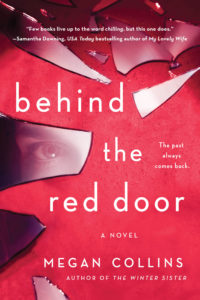How Soap Operas Influence My Writing
When asked about my biggest influences as a writer, I usually launch into my list of literary powerhouses: Toni Morrison, Tana French, Marisha Pessl. But there’s another influence I’ve never named until now, one that has taught me more about pacing, suspense, and storytelling than any single author: soap operas.
I’ve been watching Days of Our Lives, every day, for over twenty years. When I was a teenager, I’d record it on my family’s VCR to watch as soon as I got home from school, and later, it was the first show I ever programmed into my DVR. When I stand in check-out lines at grocery stores, I still riffle through the pages of Soap Opera Digest, eager to read spoilers about upcoming storylines.
Maybe it’s no wonder, then, that I write suspense novels. After all, suspense is the beating heart of any soap opera, and having devoted five hours a week to Days for more than two decades, its rhythm now feels embedded within me, dictating my instincts as a storyteller.
As a kid, I started watching soaps because my mother did. She’d eat lunch in the kitchen, eyes glued to a little TV propped up on the counter, and for a while, Days was just background noise to me—until I got hooked by a specific storyline: Vivian burying Carly alive. When it seemed like Carly would soon be rescued, I worried there’d be nothing left to watch. As far as I knew, whenever an important, climactic rescue happened in a story, that meant the ending was coming. “Do they ever start new stories?” I asked my mom hopefully, and she told me, “Yes, they start new stories all the time.” At first, I didn’t understand what she meant—I imagined an assembly line of actors coming into play a whole new set of characters each week—but it didn’t take me long to see that soaps are continually moving forward. The end of one storyline is always the beginning of another, with the characters constantly evolving as they endure new twists and turns.
I’ve adopted this soap-style of forward momentum in my own writing by thinking of each moment of plot as the start of a “new story” for my characters. I want each reveal, each piece of information, each new relationship to change the story the characters thought they were living and push them in a different direction. By reframing plot points as springboards for new stories, I’m trying to write toward the driving philosophy of every soap’s rhythm and pacing: keep it moving, and keep them wanting more.
Watching a soap takes commitment; it’s not just something you do once a week, like you would a primetime drama. As such, soap writers need to not only entice a viewer to tune in day after day, but minute after minute as well. That’s why scenes and segments end on such a dramatic note—a fiery slap or equally fiery kiss, a promise to reveal a secret—as a minor key is struck and held.
I craft every section break in one of my chapters as if it’s a cut to commercial in a soap. For me, the break doesn’t simply operate as a split between scenes; its purpose is to pluck a note of tension or drama and allow it a moment to resonate. In that way, section breaks act as mini-cliffhangers—even if it’s just a character absorbing or processing something that’s happened (think: those shots in soaps where the camera lingers on a character’s face, studying their reaction, just before the scene cuts away).
Similarly, I think of each chapter break as the end of an episode. I remember, as a soap-addicted teenager (R.I.P. Sunset Beach and Passions, two others I adored), sometimes crying out when an episode had ended, because I couldn’t imagine waiting twenty-four hours (or, worse, a whole weekend!) to find out what happened next. I want my readers to feel the same way when they finish one of my chapters. I want their eyes to leap onto the next page, desperate to keep going. That means I can’t just end a chapter because the scene has concluded, or it’s been a certain number of pages and now seems like a good time to pause. I have to end it on a reveal, a twist, an epiphany, a turning point, or even just a quiet but foreboding hint of what’s to come.
Still, it can’t be all tension all the time. Even in their most dramatic storylines, even with all the epic betrayals and explosive secrets, soaps maintain a thread of levity in each episode. Sometimes, that thread is sewn in through a humorous line of dialogue; other times, it’s through the reminder that, no matter what outlandish trope is currently keeping a beloved couple apart (Evil twins! Resurrections! Demon possessions! Amnesia!), the two characters share a deep and unavoidable bond.
The same holds true in books. Even the darkest, most emotionally grueling story requires pinpricks of light, something to remind a reader what the character is fighting for, why it’s important that they make it to the other side of whatever obstacle they’re facing. In my debut, The Winter Sister, the light to my novel’s darkness is the narrator’s kind, reliable aunt, and in my second novel, Behind the Red Door, it’s the narrator’s kind, reliable husband. (What can I say? After everything I put my protagonists through, they need someone kind and reliable.)
Soaps are also a powerful reminder of the importance of character. In fact, it’s the characters, more than the juicy storylines, that have kept me coming back to Days for over twenty years. Even when I’ve been bored with a certain story (and, believe me, it happens), I haven’t stopped watching. If I stop, I muse, I’ll never know if Stefano DiMera finally gets what’s coming to him, or I heard Sami is coming back; I have to see what happens with her character now. This has taught me to think of my own characters, in part, as vehicles for a reader’s investment. Readers don’t need to like my characters, they don’t need to want to invite them over for game night, but they should be interested in them, desperate to find out how their story unfolds. That way, they’re more likely to stick with their story, the same way I have stuck with Days.
Are my novels basically soap operas condensed into 300 pages? No. You’re not likely to find any evil twins or people coming back from the dead in my books. But they do have the pulse of a soap opera, and that comes from decades of immersing myself in the genre. So while Tana French is the master of character-driven suspense, and Toni Morrison’s prose is so gorgeous it makes me ache, neither of those authors have shaped my storytelling instincts quite the way that soap operas have. I didn’t know it when I first started watching, just a kid hooked on the gasp-inducing twists, but for every hour of my life I’ve invested in Days, I’ve actually been investing in myself as a writer.
 Megan Collins is the author of The Winter Sister and Behind the Red Door. She holds an MFA in Creative Writing from Boston University. She has taught creative writing at the Greater Hartford Academy of the Arts and Central Connecticut State University, and she is the managing editor of 3Elements Review. A Pushcart Prize and Best of the Net nominee, her work has appeared in many print and online journals, including Off the Coast, Spillway, Tinderbox Poetry Journal, and Rattle. She lives in Connecticut.
Megan Collins is the author of The Winter Sister and Behind the Red Door. She holds an MFA in Creative Writing from Boston University. She has taught creative writing at the Greater Hartford Academy of the Arts and Central Connecticut State University, and she is the managing editor of 3Elements Review. A Pushcart Prize and Best of the Net nominee, her work has appeared in many print and online journals, including Off the Coast, Spillway, Tinderbox Poetry Journal, and Rattle. She lives in Connecticut.
 About the Book: When Fern Douglas sees the news about the missing Astrid Sullivan, she’s positive she knows her. Fern’s husband says it’s because of Astrid’s famous kidnapping—and equally famous return—twenty years ago, but Fern has no memory of that. But when Astrid appears in Fern’s recurring nightmare, Fern fears that it’s not a dream, but a memory. When Fern discovers more about her own past than she ever bargained for, the disturbing truth will change both women’s lives forever. No matter how hard we try to fight it, the past always comes back.
About the Book: When Fern Douglas sees the news about the missing Astrid Sullivan, she’s positive she knows her. Fern’s husband says it’s because of Astrid’s famous kidnapping—and equally famous return—twenty years ago, but Fern has no memory of that. But when Astrid appears in Fern’s recurring nightmare, Fern fears that it’s not a dream, but a memory. When Fern discovers more about her own past than she ever bargained for, the disturbing truth will change both women’s lives forever. No matter how hard we try to fight it, the past always comes back.
